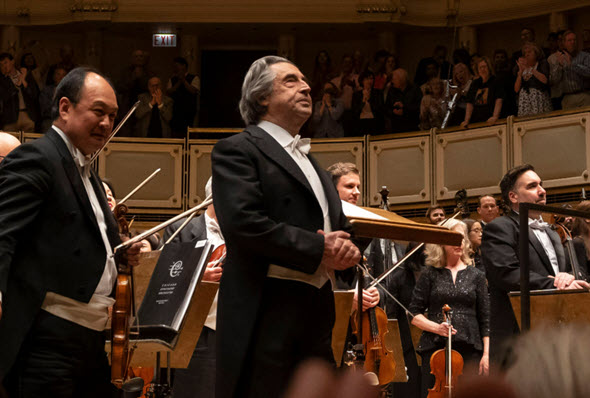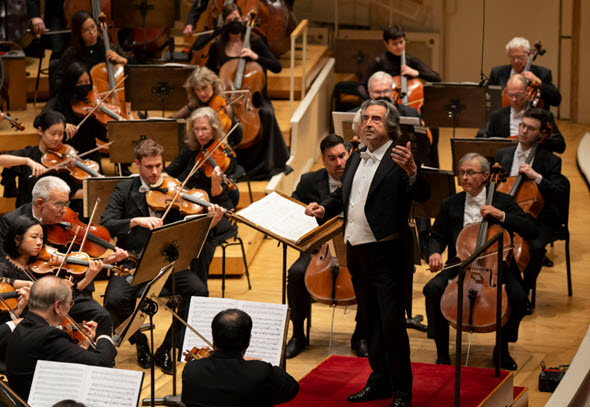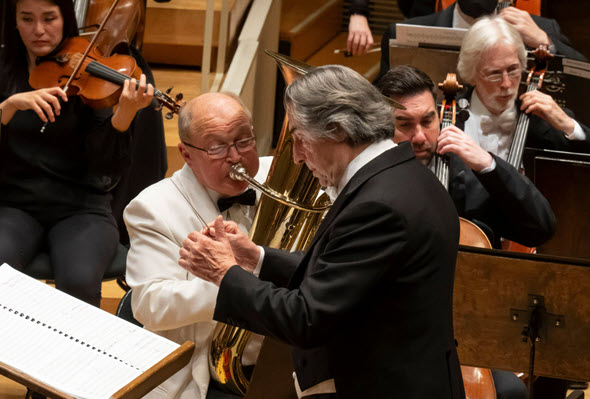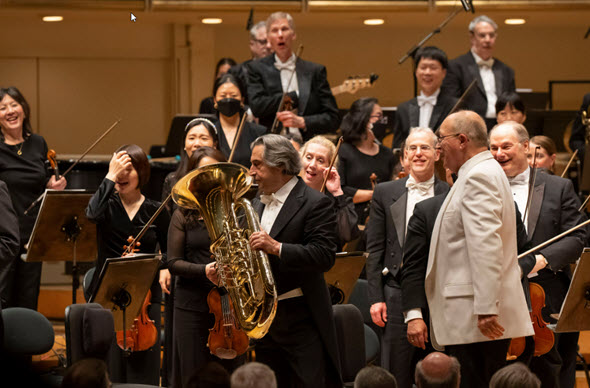With CSO’s grand Beethoven finish still ahead, Muti stamped directorship with great Schubert

Riccardo Muti and CSO musicians accept applause after Schubert’s “Great” C major Symphony. (Todd Rosenberg photos)
Commentary: Riccardo Muti’s tenure at Orchestra Hall ends with the Missa Solemnis, but it’s really been a two-week farewell.
By Lawrence B. Johnson
It has been like a double bill, or a fascinating theater piece with a twin ending, Riccardo Muti’s transition from his music directorship of the Chicago Symphony Orchestra. In any other season, the CSO concerts June 15-17 would have made a terrific finale – a delightful tuba concerto spotlighting CSO principal Gene Pokorny, with plenty of schtick thrown in, and a great performance, indeed, of Schubert’s “Great” C major Symphony. But this is not just any season, and its actual consummation with Beethoven’s Missa Solemnis (June 23-25) befits the conclusion of Muti’s 13 years at the orchestra’s helm.
The prospect of Muti’s account of Beethoven’s monumental, 80-minute work for orchestra, chorus and solo voices was a key factor in the decision of the Music Critics Association of North America to hold its annual convention in Chicago this weekend. Critics from around the U.S. and abroad will be in attendance on June 23.
While Muti’s epochal run as music director reaches its official end this month, his connection with the Chicago Symphony will remain substantive through at least the next two seasons. Muti will open the CSO’s 2023-24 season, leading the first two weeks of concerts, then take the orchestra to New York for the first two nights of concerts in Carnegie Hall’s new season. He will lead the CSO on a three-week European tour in January 2024. Muti, who turns 82 in July, also has committed to a further six weeks with the orchestra in the 2024-25 season, and mostly at Orchestra Hall.
Thus, while a CSO search committee pursues a successor as music director over the next couple of years, for the musicians and patrons alike the sense of continuity will be palpable.
Last week’s program afforded a ringing reminder of just how important Muti’s continued presence will be. In the tenure of his directorship, the bloom never left the rose — the honeymoon never ended. And the Chicago Symphony is a more complete ensemble now than it was when Muti arrived on the scene. He has made astute hires of principal players. The venerable conductor is fond of referring to the CSO as his Ferrari and routinely touts it as one of the world’s three greatest orchestras, typically citing the Vienna Philharmonic as its peer and just as regularly not naming the third (though the Berlin Philharmonic surely doesn’t require mentioning). In short, the Chicago legacy of Fritz Reiner and Georg Solti has been nobly upheld in the Muti era.
There’s the challenge tossed into the laps of the current CSO administration and the musicians who will join in the quest for a new music director. When the Schubert “Great” C major ended the night of June 15, and a nearly full house was on its feet cheering, I became aware of my own silence. My response to that whole tumultuous scene and the music that had just unfolded was: “OK, now go find a match for that.”
Talent of rare quality is out there, and my impression looking back over the last season or two — and ahead to next year — is that the CSO knows where it lies and certainly what it means to get this next move right. Muti’s breathtaking turn through Schubert’s grand symphony put me in mind of the previous week’s Mahler Ninth, led by Jakub Hrůša, and the commonality of the two works in their style of rigorous efflorescence — the seeming repetitions that upon close examination are not repetitive at all but rather an ever flowing stream of subtle inflection. The tie of Mahler to Schubert could not have been clearer. So, too, the insight and poetics displayed first by the comparatively young Hrůša and then by Muti, the unsurpassed master of line, voicing, tempo and, let’s say, musical esprit.
The “Great” C major also put the orchestra itself on arresting view. Here was Muti’s Ferrari, humming, whizzing, gleaming — a present ensemble as burnished and flexible as any in the Chicago Symphony’s modern history. What a time this has been, these 13 seasons. How quickly they have passed, and what was once an auspicious prospect now becomes prelude to another chapter.
As preface to the Schubert, Muti turned the spotlight on yet another of the orchestra’s principals in a longstanding series of such cameos that has many of the CSO musicians front and center. Here, it was principal tuba Pokorny performing the three-movement, 15-minute concerto written for him in 2016 by Lalo Schifrin, who may be most famous as the composer of the theme music for “Mission: Impossible.”
While there is something inescapably incongruous, if not quite comical, about the huge tuba as virtuosic vehicle, Schifrin’s elegantly crafted concerto pushed that notion aside, and Pokorny put on a remarkable exhibition of digital agility, breath control and lyric note-spinning. As an encore, he played lead voice in the orchestra’s performance of — what else? — the “Mission: Impossible” theme. For his part, Muti literally kicked off the band and got out of the way, stepping from the podium to lean on the shoulder of concertmaster Robert Chen as the familiar music roared off.
What successor may come, Muti’s ready sense of humor may also prove to be a high bar.




